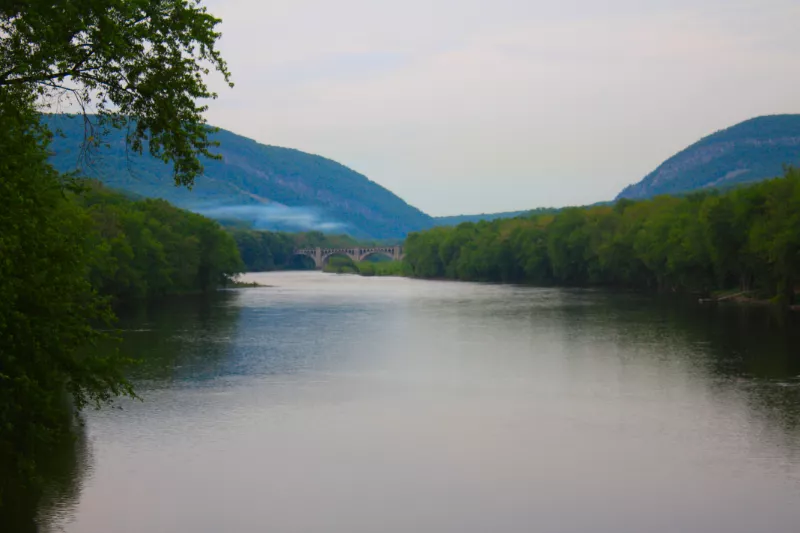
Fall 2023
Inside this issue:
Great art and a hike make for a wonder-filled day
An article about the Ned Smith Center for Nature and Art by Karl Streckewald
E. Stanley “Ned” Smith (1919-1985) was a self-trained artist and naturalist who grew up in Millersburg, Pennsylvania. He became a very prolific artist: the wildlife drawings, paintings, and prints he created could be found on the cover of magazines such as Sports Afield, Pennsylvania Angler, and National Geographic, as well as in publications of the Pennsylvania Game Commission. Along with being a wildlife illustrator, Ned was an accomplished photographer, writer, musician, and archeologist. When Ned died in 1985, his wife Marie had the idea to create an appropriate venue to house her husband’s art collection and also to highlight the beauty of the natural world that Ned loved. Thus was born the Ned Smith Center for Nature and Art, whose mission is to honor the legacy of Ned Smith by merging the arts and nature through education, exhibition, and experiences.
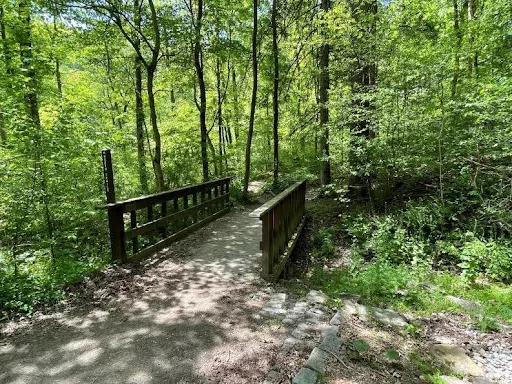
|
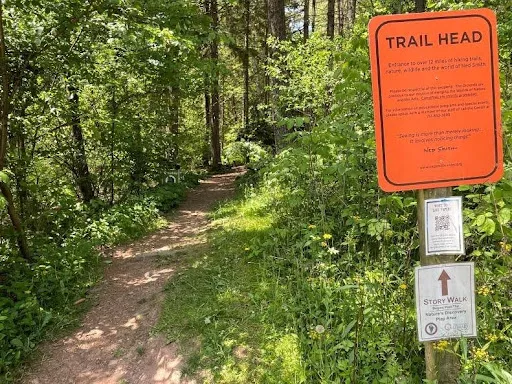
|
| Bridge to the north trails Photo by Karl Streckewald | Miles of trails begin here Photo by Karl Streckewald |
The Center encompasses 500 acres of beautiful woods and meadows where you may find deer, bears, turkeys, foxes, and hundreds of species of birds. The Ned Smith Center is so far removed from the hustle and bustle of any city that even on the shorter and more accessible trails, you will quickly become immersed in the natural world that surrounds you. There are 14 different trails which encompass a range of interests and abilities. The trails range from 0.14 miles to 2 miles and from easy to extremely difficult. There are options of accessible trails, horseback riding trails, bike trails, and cross country skiing trails.

|
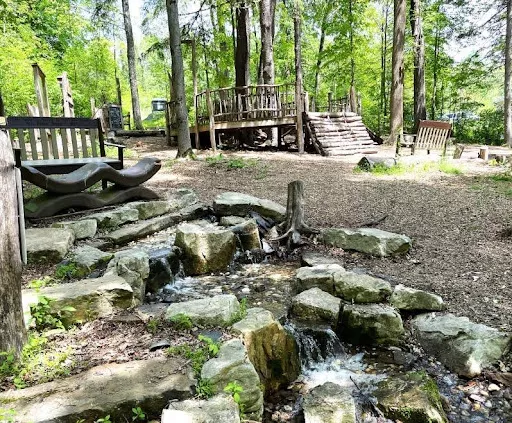
|
| Storyboard Trail Photo by Karl Streckewald | Nature Discovery Play Area Photo by Karl Streckewald |
One of the trails even has a Storyboard book along it. Storyboard is a series of sign-sized book pages that let you experience the pages of a book as you walk along the trail. These are sponsored by local libraries and are quite popular with children. Also popular for children is the Nature Discovery Play Area. This playground is a very short walk from the education building and is made from natural materials and includes structures for play as well as education. There are benches and picnic tables in the area, and it’s a very pleasant location for a picnic lunch or snack. The Ned Smith Center does allow some hunting on land further back from the Center, so check a trail map to see if it should be a concern on your chosen trail. If in doubt, check with personnel in the education building and consider wearing bright colors, especially in the more popular hunting seasons.
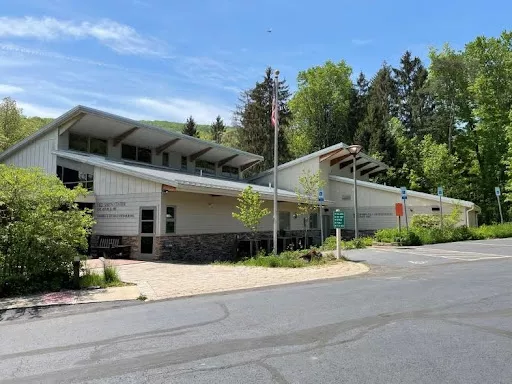
|
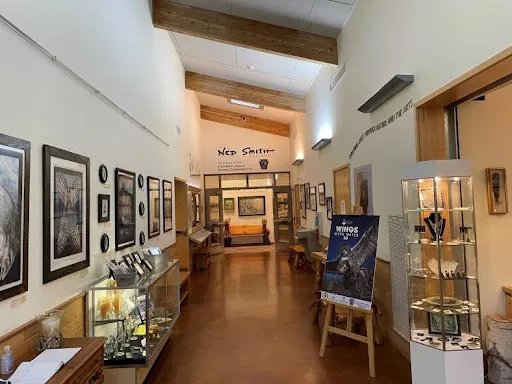
|
| Education Center Photo by Karl Streckewald | Main hall leading to Ned Smith Gallery Photo by Karl Streckewald |
The “Arts” part of the name refers to the Education Center and Amphitheater. Nestled in the woods is the main building: The Sourbeer and Lick Education Building. This houses the offices, gift shop, galleries, and classrooms. The gift shop offers nature-themed mementos, books, and Ned Smith prints. The three galleries include the Ned Smith Gallery which houses the permanent collection of Ned Smith works, the Olewine Gallery which features a rotation of national and world renowned exhibits, and the Romberger Gallery which gives promising local artists greater exposure for their work. The classrooms house education programs in art, citizen science programs, and hands-on nature experiences for all ages. Several years ago my wife and I took several of our grandchildren to a “Grandparent and Me” craft activity. It was very well run, and the classroom had many fascinating nature exhibits that the kids loved seeing.
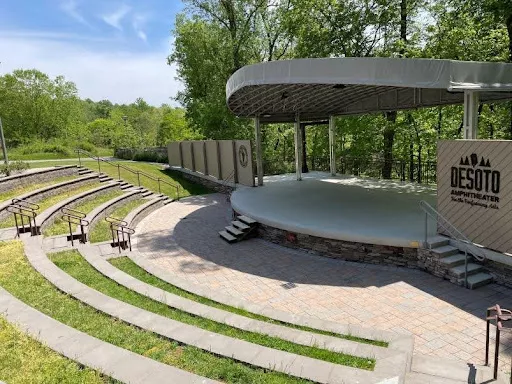
|
| DeSoto Amphitheater Photo by Karl Streckewald |
In 2014 the Center opened the DeSoto Amphitheater. The amphitheater showcases regional and national music, ballet, and theater performances in a natural setting under the stars. Events are held throughout the summer, and the schedule is listed on the Ned Smith website. A trip to the Ned Smith Center makes an excellent day trip for nature lovers of all ages and levels of interest and ability. There is a charge for some of the amphitheater productions, art exhibits, and classes, but many are free, so check the website for more information. The center is located at 176 Water Company Road in Millersburg, PA. The website is nedsmithcenter.org and gives information about the center, driving directions, and schedules for the galleries, classes, and performances. The thirtyfive-minute drive from Harrisburg is certainly worth the time to get to such a beautiful and enjoyable location.
Trivia Corner
by David Platt
Which national park site is located in two states but not in the state named in its title?
National Park System Designations
By David Platt When you think of a national park, what comes to mind? You probably think of Yellowstone, the Grand Canyon, or one of the other national parks from Acadia to Zion. Pennsylvania doesn’t have a national park, right? Yes and no. Although Pennsylvania doesn’t currently have a site that is designated as a “national park,” we have several national park sites. Two of the most visited are Gettysburg National Military Park and Independence National Historical Park. In fact, each of these sites gets more yearly visitation than some national parks—think Great Basin NP or Gates of the Arctic NP. Pennsylvania has a number of other national park sites that include national historic sites and a national recreation area. The National Park System includes a multitude of site designations from national monuments to national scenic rivers to national battlefields. "National park" is just one of those designations within the system. By way of the Antiquities Act of 1906 the president has authority to declare national monuments which are often put under the authority of the National Park Service. But some national monuments are placed under the Bureau of Land Management and others fall under the Forest Service or other federal agencies. The U.S. Congress passes bills to create all of the other national park sites from national parks to national memorials which the president then usually signs into law. The designation of “national park” is considered by most to be more prestigious than “national monument.” With that in mind, several national monuments and other sites have been redesignated by Congress as national parks. Grand Canyon started as a national monument in 1908, then Congress, recognizing its unique and important value to the United States and the world, redesignated it as a national park in 1919. On the flip side some national parks have been redesignated or even eliminated by Congress. For instance, Platt National Park in Oklahoma, named for a U.S. senator distantly related to the author of this piece, was renamed Chickasaw National Recreation Area in 1976. For more information about these designations visit the National Park Service website at www.nps.gov/articles/nps-designations.htm
Trivia Corner AnswerDelaware Water Gap National Recreation Area |
|
|
Group Chair's Corner
What has the Governor Pinchot Group been doing so far in 2023?
The Governor Pinchot Group (GVP) offered eight hikes, which included observing wildlife and learning about wildlife and environmental issues in the area. On these hikes, GVP partnered with and learned about four other organizations. GVP is fortunate to have three Outing Leaders in the Group that set up and led these outings. We continued maintenance on a tree planting site for the Alliance for the Chesapeake Bay and did highway cleanups for PennDOT. We also endorsed political candidates for this Fall’s election. We tabled at three Festivals and all three days at Kipona. We also offered two environmental education presentations, including an interesting and informative presentation at the Wildwood Park in Harrisburg. A complete list of GVP events and meetings are available on our website at sierraclub.org/pennsylvania/governor-pinchot. Also find us on Facebook and Instagram . We’ll soon begin planning events for 2024, which will be listed on the GVP website early in the year. If you are interested in attending a GVP meeting, select the meeting on the GVP website and register, and we’ll email you the Zoom link and agenda.
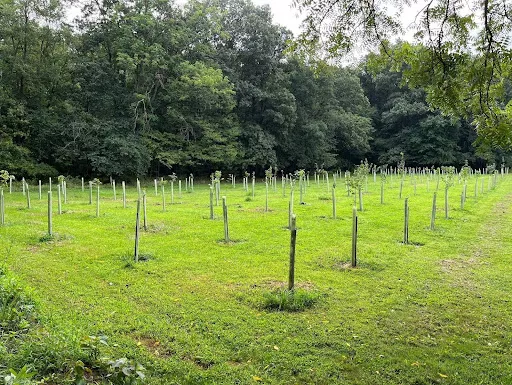
|
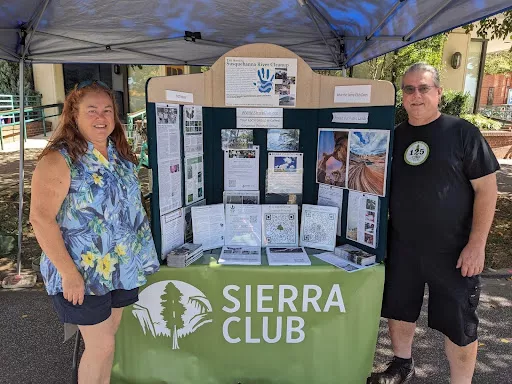
|
|||||
|
The GVP Group tabling at Kipona in Harrisburg. |
Thank you for your support and all you do for the environment, Bob Rebuck Chair, Sierra Club Governor Pinchot Group
